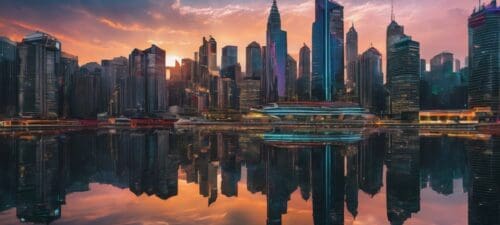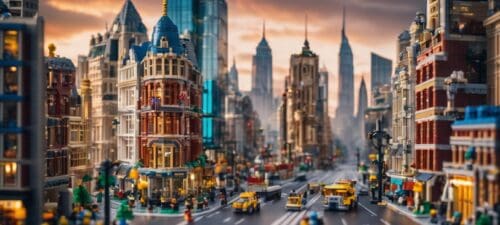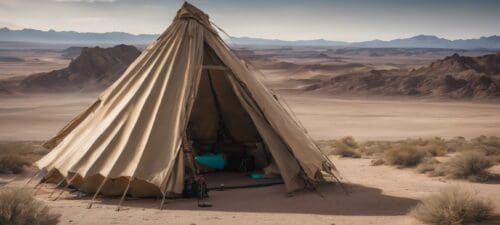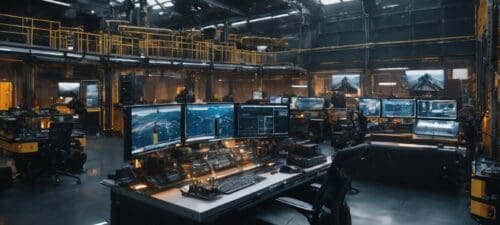Inside: A Dystopian Nightmare
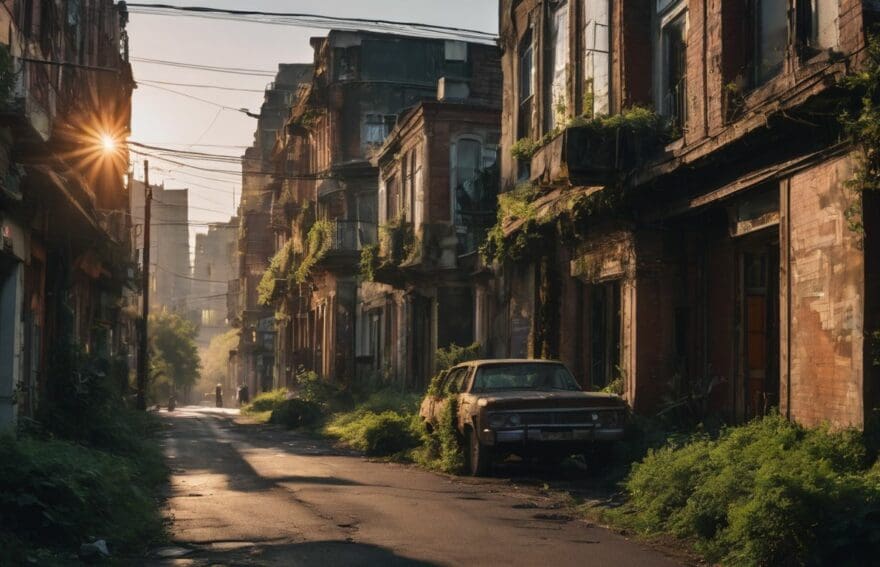
Updated On: November 03, 2025 by 
In these curious times, the boundary between what’s real and the harrowing world of dystopian tales grows ever more faint. Much like yourself, we’ve borne witness to disconcerting omens of society’s slide into a realm that once belonged purely to fiction—internet blackouts orchestrated by governments are on the rise globally, stifling countless voices in their wake.
Our investigative piece delicately unfolds these complex layers, shedding light on the profound ways such chilling developments might be infiltrating our daily existence. Embark with us on an enlightening journey through our latest article—it promises to offer a fresh perspective on the familiar landscapes we thought we knew so well.
Living in a Dystopian Nightmare: Signs and Indicators
Living in a dystopian nightmare can be easily identified through various signs and indicators. From internet shutdowns to corporate greed, the lack of accountability and leadership failures, these are just some of the warning signs that we may be living in a nightmarish society.
Internet shutdowns
Internet shutdowns are more than just a bump in our digital journey; they’re a dark sign of the totalitarian grip tightening around us. We often hear how governments cut off access to the world wide web, leaving citizens stranded in an information blackout.
This oppressive move disconnects communities and plunges people into isolation, making it hard for us to share experiences or seek help from outside. It’s like someone flicks a switch and throws entire populations into despair.
These shutdowns attack the very heart of our human rights by stripping away our ability to communicate freely. Consider them an alarm — we’re not talking about temporary glitches but calculated efforts by authoritarian regimes to suppress voices and control narratives.
They push us towards a grim reality where being informed is no longer something we can take for granted. As this nightmare unfolds, let’s look closely at what lack of accountability does to society’s fabric – because that’s what comes next on this bleak agenda.
Lack of accountability
In a dystopian nightmare, the lack of accountability among leaders and institutions perpetuates inequality and unjust treatment. Without robust checks and balances, corporate greed thrives unchecked, leading to widespread exploitation and suffering.
Discrimination and oppression are allowed to fester when those in power evade responsibility for their actions, contributing to a society that is dysfunctional, oppressive, and filled with inconsistencies.
This absence of accountability breeds an environment where individuals’ basic rights are compromised, fuelling further injustice.
The concept of “lack of accountability” resonates deeply within a dystopian nightmare – it denotes a fundamental breakdown in societal structures that should safeguard against discrimination and inequalities.
Leadership failures
Leadership failures contribute to the deterioration of society, leading to an oppressive and unjust environment. In a dystopian nightmare, leaders often lack accountability, perpetuate discrimination and inequalities, and fail to uphold basic rights and freedoms.
Corporate greed can take control over societal structures, causing further division and hardship for citizens.
In this bleak existence, leadership failures result in a sense of hopelessness as individuals struggle under an oppressive regime. Our daily lives are negatively impacted by the consequences of these leadership shortcomings, adding fuel to the fire of discontent within our communities.
AutoCAD dependence
In a dystopian nightmare, AutoCAD dependence is a sign of corporate control and lack of individual freedom. The reliance on this software for design and engineering work limits creativity and innovation, perpetuating a cycle of conformity.
This heavy reliance also leads to the consolidation of power in the hands of few corporations, creating an unequal playing field for smaller businesses and entrepreneurs.
This dependence on AutoCAD not only restricts technological diversity but also fosters a culture where individual skills are overshadowed by the capabilities of technology. The widespread use of AutoCAD contributes to the erosion of human-centric design principles, leading to a future where creative expression takes a backseat to standardised templates and algorithms.
Censorship
Censorship suppresses free speech and restricts access to vital information, creating a sense of isolation. It fuels an environment of control and oppression, shaping the narrative to suit those in power.
Government internet shutdowns are on the rise globally, cutting off communication channels and limiting citizens’ ability to express dissent. This insidious tactic isolates people and stifles their voices, perpetuating a cycle of fear and compliance.
In a dystopian nightmare, censorship is a tool used to maintain authoritarian control, further entrenching the bleak future of oppressed societies.
Corporate greed
Transitioning from the oppressive nature of censorship, corporate greed permeates through our society, leaving a lasting impact on all aspects of life. The pursuit of profit often comes at the expense of fairness and equality, creating a world where materialistic goals overshadow basic human rights.
Discriminatory practices and inequalities thrive under the shadow of corporate greed, contributing to an unjust and dysfunctional society. This unchecked pursuit for wealth leads to a dystopian nightmare characterised by exploitation, oppression, and widespread injustice.
The insidious effects of corporate greed are evident in the lack of accountability and leadership failures that further exacerbate the already desperate conditions within this totalitarian world.
How This Nightmare Affects Our Daily Lives
The dystopian nightmare affects our daily lives by creating a sense of disconnection from society, diminishing human rights, and fostering a constant pursuit of materialistic goals that lead to burnout and mental health issues.
It is important to understand the impact of this reality on our wellbeing and take action towards building a better future for all.
Disconnection from society
In a dystopian nightmare, disconnection from society is a pervasive issue that affects individuals on multiple levels. Citizens experience isolation and alienation due to the lack of community cohesion and support systems.
This disconnect leads to social fragmentation, making it challenging for people to find solace in their immediate environment.
Furthermore, disconnection from society fosters division and suppresses collective action against oppressive practices. The absence of strong social bonds erodes trust and unity, contributing to an environment where individual voices are drowned out by the overwhelming sense of desolation and disarray present in this totalitarian world.
Loss of human rights
Disconnected from society, individuals in a dystopian nightmare also face the loss of human rights. Discrimination and inequalities prevail, leading to a sense of oppression among the population.
This lack of basic rights and freedoms characterises a dysfunctional, oppressive, and unjust society. In such a world, individuals are denied their fundamental liberties and are subjected to tyrannical rule with no recourse for justice or equality.
The concept of a dystopian nightmare is often associated with totalitarianism and the absence of any semblance of individual freedom or dignity. As this reality takes hold, those living within it find themselves stripped not only of personal autonomy but also their ability to advocate for change or progress towards fairness.
Constant pursuit of materialistic goals
Transitioning from the loss of human rights to examine the constant pursuit of materialistic goals, we find ourselves grappling with a society driven by consumerism and an insatiable desire for wealth.
In this dystopian reality, individuals are conditioned to prioritise financial success and material possessions over meaningful connections and personal well-being. The relentless pressure to acquire more possessions often leads to a never-ending cycle of dissatisfaction and greed.
The notion of accumulating wealth at any cost is ingrained within the fabric of this dystopian nightmare, fuelling a culture where personal value is equated with material possessions rather than intrinsic qualities or genuine relationships.
Burnout and mental health issues
Burnout and mental health issues are prevalent in a dystopian nightmare. The constant pressure to survive and endure in an oppressive society can lead to debilitating burnout, taking months to recover from.
The lack of work-life balance and the overwhelming pursuit of materialistic goals contribute to the deterioration of mental well-being. Discrimination, inequalities, and the absence of basic rights only exacerbate the mental strain experienced by individuals within such a tyrannical world.
The concept of self-care is vital in combating burnout and maintaining good mental health amidst a dystopian nightmare. Engaging in activities that promote relaxation, seeking support from communities, and advocating for change are crucial steps towards preserving one’s well-being while navigating through insidious societal challenges such as leadership failures, censorship, corporate greed, internet shutdowns, and autoCAD dependence.
The Role of Community and Responsibility
Community plays a crucial role in shaping society, and it’s our collective responsibility to work towards positive change. By coming together and taking action, we can make a significant impact on the world around us.
Collective impact on society
The collective impact on society in a dystopian nightmare is significant. Discrimination and inequalities pervade, leading to a sense of oppression and injustice. Basic rights and freedoms are often compromised, creating a dysfunctional and unequal environment.
The lack of universal healthcare, paid leave from work, and the increasing government internet shutdowns isolate individuals further, contributing to an insidious and isolating atmosphere that breeds disconnection from society.
Furthermore, the constant pursuit of materialistic goals in this dystopian reality leads to burnout and mental health issues for individuals struggling with the crush of work and life demands.
Call for action
- Collective impact on society can lead to significant change. We must advocate for policies that ensure universal healthcare and paid leave from work to eradicate inequalities.
- Promoting diversity and inclusivity is crucial. Game experts and novices should use their platforms to raise awareness about discrimination and oppression in society.
- Engage in community activism to combat corporate greed and censorship, advocating for accountability and transparency in leadership.
- Encourage participation in local initiatives that aim to address the burnout epidemic, prioritising mental health and work-life balance.
- Utilise our collective voice to demand an end to internet shutdowns, promoting connectivity as a basic human right.
Promoting diversity and inclusivity
We understand the urgency for change and transformation in our society. We must actively promote diversity and inclusivity within our communities to create a more equitable and just environment.
Embracing different perspectives, cultures, and backgrounds is crucial in dismantling the oppressive structures that perpetuate discrimination and inequality. It’s essential to recognise the value of each individual‘s unique contributions to foster a more inclusive society where everyone feels empowered and valued.
Advocating for diversity and inclusivity not only enriches our communities but also enables us to collectively address societal issues from various vantage points. By amplifying marginalised voices, we can work towards creating a world where everyone has equal opportunities to thrive, regardless of their background or identity.
The Dystopian Reality of America
America is currently facing a grim reality, as the nation grapples with political unrest and division. The impact on citizens is profound, leading to a sense of disillusionment and uncertainty about the future.
Photos showcasing the current state
Photos reveal the stark reality of America’s dystopian nightmare, painting a picture of societal unrest and division. Citizens are grappling with the impact as they navigate through a landscape marred by political turmoil and escalating tensions.
The images vividly capture the struggles faced by individuals, shedding light on the pervasive challenges that have permeated everyday life. These visual representations serve as poignant reminders of the pressing need for collective action to address the issues plaguing society.
The photographs depict an undeniable truth – our world is teetering on the edge of a dystopian nightmare, where inequalities loom large and basic rights are under threat. It’s evident from these visuals that we must come together to confront this harsh reality, standing united against oppression and injustice in all its forms.
Impact on citizens
Citizens in a dystopian nightmare experience a loss of basic rights and freedoms, leading to feelings of oppression and inequality. Discrimination is prevalent, creating a sense of injustice within society.
As a result, individuals are often disconnected from the community and face constant pursuit of materialistic goals in order to survive. This leads to burnout and mental health issues as people struggle with the crushing weight of work and life.
In such a society, citizens also grapple with political unrest and division, further deepening the disconnection within communities. The impact on mental well-being can be debilitating as individuals fight for survival amidst an oppressive environment.
Political unrest and division
The impact on citizens can lead to political unrest and division in a dystopian nightmare. Discrimination, inequalities, and oppressive practices create social tension and fuel division among the population.
In a society where basic rights and freedoms are lacking, political unrest becomes inevitable as people strive for change and justice. As tensions rise, the potential for conflict increases, further deepening the divisions within the community.
Moreover, the lack of accountability from leadership exacerbates these issues. The absence of transparency and fair governance fuels mistrust among citizens, leading to heightened political instability.
Conclusion: Finding Hope in a Dystopian Nightmare
In a dystopian nightmare, signs of oppression and inequality are prevalent. We must rally together to fight for accountability and basic rights. Embracing diversity can pave the way towards a hopeful future.
Taking collective action is crucial in reshaping our society into one that champions justice and equality. Together, we have the power to rewrite this narrative of despair and build a brighter tomorrow.
FAQs
1. What is “Inside: A Dystopian Nightmare” about?
“Inside: A Dystopian Nightmare” explores a future world under strict totalitarian rule, showing the dark sides of a society without freedom.
2. Does the story take place in our present time?
No, “Inside: A Dystopian Nightmare” takes place in a futuristic setting where life and governance have dramatically changed.
3. Will I see what life is like under totalitarian control in this narrative?
Yes, the narrative vividly depicts the struggles and challenges people face living under an oppressive totalitarian government.
4. Is “Inside: A Dystopian Nightmare” suitable for young readers?
Due to its themes of dystopia and harsh rule, it might be more appropriate for older kids and teenagers who can understand these complex ideas.



